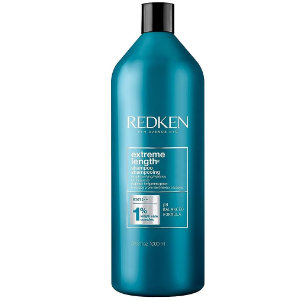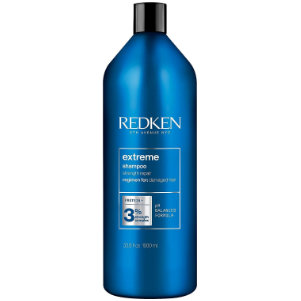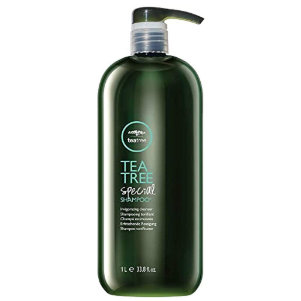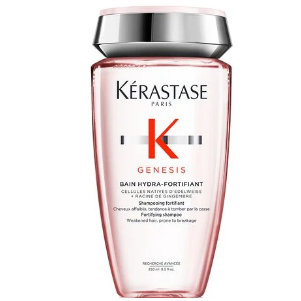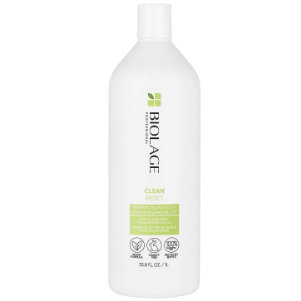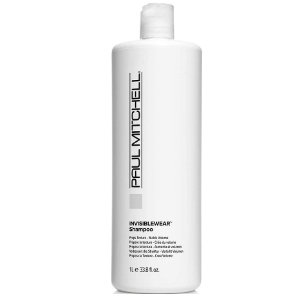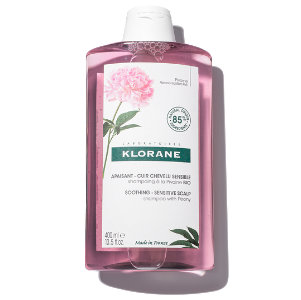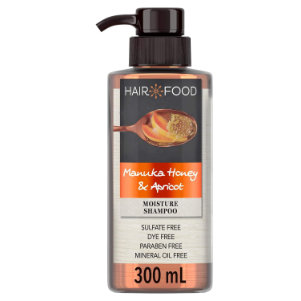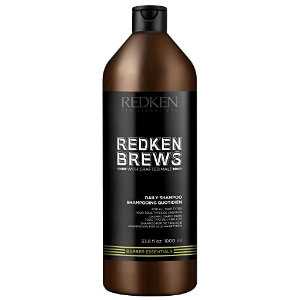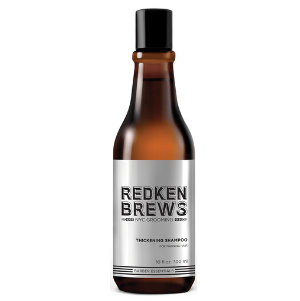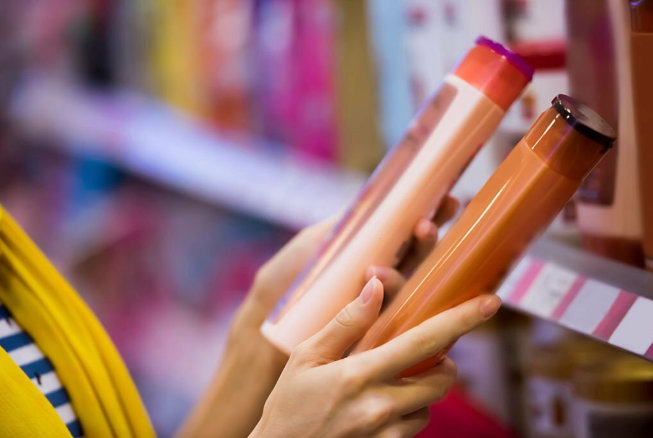
Table Of Contents
- 1 A Quick Look: Top Fungal Acne Safe Shampoos That Deliver Long-Lasting Results
- 2 Understanding Fungal Acne and How it Differs From Traditional Acne
- 3 The Importance of Choosing the Right Shampoo for Fungal Acne-Prone Scalp
- 4 Top 10: Best Fungal Acne Shampoo Products Right Now
- 4.1 1. Redken Extreme Length Shampoo with Biotin
- 4.2 2. Redken Extreme Length Shampoo (3% Strenght Complex)
- 4.3 3. Paul Mitchell Tea Tree Lemon Sage Thickening Shampoo
- 4.4 5. KERASTASE Genesis Hydra-Fortifiant Shampoo
- 4.5 5. Biolage Clean Reset Normalizing Shampoo
- 4.6 6. Paul Mitchell Invisiblewear Shampoo
- 4.7 7. Klorane Soothing Shampoo with Peony
- 4.8 8. Hair Food Shampoo Manuka Honey & Apricot Moisture Shampoo
- 5 Fungal Acne Safe Shampoo for Men
- 6 An Important Key Factor to Consider When Choosing a Fungal Acne Shampoo for Scalp Care
- 7 Other Hair Care Best Practices for Fungal Acne
- 8 Pitfalls to Avoid When Using Shampoos for Fungal Acne Prone Scalp
- 9 Ingredients to Avoid when Shopping for Fungal Acne Shampoos
- 10 Conclusion
If you’re dealing with fungal acne, finding the right shampoo can be a tricky task. This skin disease can wreak havoc on your hair care routine, leading to scalp irritation, flakiness, itchiness, breakage, and even hair loss if left untreated.
But fear not, we’ve got you covered with some amazing hair care product options that are both safe for fungal acne and effective for maintaining healthy, beautiful hair.
These shampoos not only cleanse the hair and scalp but can also help reduce the various symptoms related to this skin condition.
So, get ready to revamp your hair care routine with these incredible fungal acne safe shampoos, and say goodbye to the frustrations that come with scalp folliculitis.
Before we dive into the best fungal acne shampoo options, it’s important to note that this is not a fungal acne treatment shampoo guide. That information can be found in our ultimate product treatment guide for fungal acne.
So you won’t find products like Nizoral Anti-Dandruff Shampoo (Ketoconazole), Head & Shoulders (Pyrithione Zinc), or Selsun Blue (Selenium Sulfide) on this list, as they’re more targeted towards the treatment of fungal acne rather than maintaining a good hair-care regimen.
So, without further ado, let’s explore the best fungal acne shampoo options that you can incorporate into your daily routine!
A Quick Look: Top Fungal Acne Safe Shampoos That Deliver Long-Lasting Results
- Redken Extreme Length Shampoo With Biotin – Best fortifying
- Redken Extreme Length Shampoo – Best for helping hair grow long and strong
- Paul Mitchell Tea Tree Lemon Sage Thickening Shampoo – Best for adding volume
- KERASTASE Genesis Hydra-Fortifiant Shampoo – Strengthens weak oily hair
- Biolage Normalizing Clean Reset Shampoo – Best for intensive hydration and refreshing cleansing
- Paul Mitchell Invisiblewear Shampoo – Best to add shine and build texture
- Klorane – Soothing Shampoo with Peony – Best shampoo for folliculitis – for itchy, irritated scalp
- Hair Food Shampoo Manuka Honey & Apricot Moisture Shampoo – Best hair moisturizing
Top-rated shampoo for fungal acne for men
- Redken Brews Daily Shampoo: Best daily non-stripping
- Redken Brews Thickening Shampoo – Best for firming and thickening of thinning hair
Understanding Fungal Acne and How it Differs From Traditional Acne
Since we have already talked at length about fungal acne, we won’t be repeating a lot of information here.
To cut a long story short, fungal acne is an infection caused by Malassezia, a common skin yeast.
Malassezia is reported to be able to shift from a normal, healthy yeast to a disease-causing form at opportunistic moments under particular conditions that science is still striving to completely understand.
This novel form triggers a series of inflammatory responses in the host organism, which then manifests locally. An unpleasant side effect of this anti-inflammatory response is pityrosporum folliculitis, also known as fungal acne, which appears as tiny, itchy pimples on the scalp or skin surface as the body battles the disease-causing agent.
The difference between fungal acne and bacterial acne is that the former is caused by a bacterial overgrowth on the skin, while the latter is caused by yeast overgrowth; hence, typical acne therapies may not be effective against fungal acne.
For more information on this skin condition, we recommend checking out our previous blog post, which provides a deeper dive into what fungal acne is.
The Importance of Choosing the Right Shampoo for Fungal Acne-Prone Scalp
Choosing the right shampoo for folliculitis-prone scalp is crucial for managing the condition and maintaining beautiful hair like a pro.
Look for shampoos that are free of pore-clogging and fungus-feeding ingredients like Coconut oil, Olive oil, Castor oil, Shea Butter, Ethylhexyl palmitate, or Lanolin or Mineral oil, as these can worsen the condition.
The right shampoo will cleanse thoroughly without stripping the hair of its natural oils, be gentle on the scalp, and settle any irritation or burning sensations.
It should also help in maintaining a healthy scalp microbiota and pH level, both of which can play a role in preventing recurrent outbreaks of fungal acne.
By selecting the right shampoo, you can effectively handle fungal acne while keeping your hair healthy, shiny, and gorgeous.
Top 10: Best Fungal Acne Shampoo Products Right Now
Finding the right fungal acne safe shampoo can make a world of difference when it comes to managing and preventing flare-ups.
But, with so many options available, it can be overwhelming to choose the best product for your specific needs.
That’s why we’ve curated a round-up of top-notch fungal acne shampoos that will not only leave your hair feeling clean and fresh but will also leave it healthier, stronger, and more beautiful than ever before.
These products are highly recommended since they help maintain a healthy scalp while easing the irritating symptoms of fungal acne.
Disclosure: We may receive a tiny commission if you purchase through the links we provide. Thank you for considering our recommendations.
1. Redken Extreme Length Shampoo with Biotin
Redken Extreme Length Shampoo with Biotin is an enriched strengthening shampoo specially formulated to stimulate hair growth.
This product features the powerful combination of Biotin and Redken’s exclusive Length Care Complex, which works wonders in fortifying and promoting the growth of damaged hair.
The Extreme Length with Biotin shampoo is designed to gently cleanse and strengthen damaged hair and has the potential to reduce breakage by up to 81%.
Pros:
- Gentle Cleansing
- Reduces hair breakage by up to 81% with consistent use
- Formulated with Biotin and Redken’s Length Care Complex to grow hair up to 6 inches
- Gently cleanses the hair and promotes stronger hair strands
Drawbacks:
- May not be suitable for individuals with very oily hair
Specifications:
- Liquid Gel to Foam format
- Suitable for all hair types, especially breakage-prone hair that won’t grow longer due to damage
- Dermatologist tested
- Vegan, pH balanced, SLS-Free, Paraben-Free, Mineral Oil-Free, Alcohol-Free, Silicone-Free
- Eco-friendly packaging
- Made in France
Usage and Application:
- Apply to wet hair, massage into a lather, and rinse thoroughly. Repeat if necessary. For best results, follow with a solid fungal acne safe Moisturizing Conditioner
Foot Notes:
- This shampoo is gentle enough for color-treated hair
- 93.17% biodegradable formulation
Price and Availability:
2. Redken Extreme Length Shampoo (3% Strenght Complex)
Redken’s Extreme Shampoo adds strength while conditioning for salon-quality results. It is an outstanding pick for persons with all forms of damaged and compromised hair, especially those who are battling with scalp fungal acne.
This shampoo eliminates buildup while fortifying weak strands to avoid further damage and breakage. Hair is reinforced and strengthened thanks to Redken’s proprietary Strength Complex, while Citric Acid restores the hair’s natural pH balance, making it soft and manageable.
The shampoo is mild enough for daily use and promotes healthy scalp and hair growth.
Pros:
- Strengthens and repairs all types of damaged hair
- Fortifies weakened areas of the hair
- Prevents future hair breakage
- Treats the root, core, and tip of the hair
- Cleanses and restores damaged, brittle hair
- Leaves hair with a soft, shiny finish
Drawbacks:
- May not be suitable for excessively dry hair
Specifications:
- Liquid: Gel to Foam
- Dermatologist tested
- Suitable for Breakage-Prone Hair
- Key Ingredients: Salicylic Acid and Biotin
- Vegan, pH balanced, Mineral Oil-Free, Alcohol-Free, Silicone-Free, SLS-Free, and Paraben-Free
- pH Balanced Formula
- Eco-friendly packaging
- Made in France
Usage and Application:
- Apply to damp hair, lather, and rinse. If necessary, repeat. Get the best results with a fungal acne-safe moisturizing conditioner.
Foot Notes:
- 93.17% biodegradable formula, Eco-friendly packaging
Price and Availability:
3. Paul Mitchell Tea Tree Lemon Sage Thickening Shampoo
Paul Mitchell’s Tea Tree Lemon Sage Thickening Shampoo is a nourishing and strengthening shampoo that also helps to lessen the symptoms of fungal acne.
This shampoo contains Tea Tree Oil and Panthenol, which work together to increase volume and add fullness. Experience the volumizing and plumping effects they provide, giving your fine hair strands the body they deserve.
It is safe for color-treated hair, vegan, and cruelty-free. This zesty shampoo can be used on all types of fine hair.
Experience the invigorating effects of this formula as it adds volume to your hair, leaving it looking and feeling fresh, full, and vibrant.
Pros:
- Increases volume and plumps thin hair strands to create a more voluminous look
- Tea tree clarifies fungal acne symptoms
- Panthenol helps strengthen and protect hair against split ends
- Color-safe, vegan, and cruelty-free
- Invigorating citrusy scent
Drawbacks:
- May not be ideal for those with coarse, thick hair
Specifications:
- Liquid gel to foam (a little goes a long way)
- Key Ingredients: Tea Tree Oil, Panthenol
- Suitable for all types of fine hair
- Color-safe
- Vegan and Cruelty-free
- Paraben, Gluten, and Alcohol-free
Usage and Application:
- Gently massage a small amount onto damp hair, focusing on the scalp and strands. Make sure to rinse the product thoroughly. Combine with an excellent fungal acne-safe moisturizing conditioner for best results.
Foot Notes:
- Paul Mitchell is committed to sustainability and uses packaging that is biodegradable and recyclable
Price and Availability:
Read our previous article about expert tips for achieving clear, smooth, radiant skin with almond clear’s mandelic acid products.
5. KERASTASE Genesis Hydra-Fortifiant Shampoo
The KERASTASE Genesis Hydra-Fortifiant Shampoo is a delicate fortifying shampoo that gently cleanses and strengthens weak and fragile hair.
The key ingredients, Salicylic Acid, Ginger Root, and Edelweiss Native Cells, gently remove sebum & environmental pollutant particles from the scalp and hair while providing oil control.
It is designed for normal to oily, weakened hair that is prone to falling due to breakage from heat damage or brushing.
The shampoo is silicone-free and is gentle enough to be used daily to strengthen weakened hair.
It is suitable for fine textured hair and has a great floral scent that leaves your hair smelling fresh and clean.
Pros:
- Controls oil production for a balanced scalp
- Gently exfoliates to remove acne-causing build-up from the scalp
- Strengthens weak and fragile hair
- Decreases hair fall caused by breakage
Drawbacks:
- May potentially exacerbate dryness in already dry hair
Specifications:
- Key ingredients: Salicylic Acid, Edelweiss Native Cells and Ginger Root
- Suitable for all types of fine, oily hair
- Alcohol-free
- Paraben-free
- Recyclable packaging
- Formula type: Liquid Gel to Foam
Usage and Application:
- Apply to wet hair. Lather, Rinse, Repeat. Rinse thoroughly. In case of contact with eyes, rinse them immediately and thoroughly. Use a fungal acne-safe moisturizing conditioner for best results.
Foot Notes:
- Reduces hair fall due to breakage from brushing by 97%
- 95% recycled plastic, making it an eco-friendly choice
Price and Availability:
5. Biolage Clean Reset Normalizing Shampoo
Biolage Normalizing Clean Reset Shampoo is a powerful cleansing treatment designed to cater to all hair types, from natural to fine hair.
This formula is free of parabens and effectively cleanses the hair without causing dryness. It also helps to remove impurities and build-up from the scalp.
This product has been specifically formulated to promote a balanced scalp and provide hydration for optimal hair health.
This shampoo is formulated with lemongrass, salicylic acid, sage, and chamomile, which are powerful ingredients known for their renewing and soothing properties, making it particularly beneficial for individuals who are dealing with scalp fungal acne.
Pros:
- Effectively cleanses hair and scalp while maintaining moisture
- Nourishes and hydrates hair, promoting a healthy appearance
- Restores balance to the scalp and supports overall scalp health
- Suitable for all hair types
Drawbacks:
- May not be ideal for individuals with oily hair types
Specifications:
- Key ingredients: Lemongrass, Salicylic Acid, Sage, and Chamomile
- Ideal for any hair type
- Transform liquid gel into foam
- Eliminates scalp residue and dirt
- Curly hair approved
- Paraben-free
- Cruelty-Free
- Vegan
- Salon recommended
Usage and Application:
- Gently apply to damp hair and create a rich lather by massaging it in. For optimal results, make sure to rinse your hair thoroughly and then use a fungal acne-safe moisturizing conditioner as a follow-up for best results.
Foot Notes:
- Biolage Professional prioritizes sustainability by using 100% recycled bottles, excluding the cap.
Price and Availability:
6. Paul Mitchell Invisiblewear Shampoo
For individuals in search of a shampoo that not only cleans the hair but also adds texture, the Paul Mitchell Invisiblewear Shampoo is an excellent product to consider purchasing.
This lightweight shampoo is ideal for building an excellent foundation for styling, as it effortlessly removes all traces of impurities and dirt from hair and scalp.
Panthenol, a soothing and moisturizing ingredient, and Willow Bark, which soothes the scalp and reduces inflammation, make this shampoo ideal for people with scalp fungal acne.
Transform your hair and get the body you need with the help of some texture and lightweight volume. Not only that, but this shampoo also works to soften each strand, making them more manageable
Pros:
- Gives body with texture and lightweight volume.
- Softens hair for easier management
- Exceptional Cleansing
- Panthenol and Willow Bark Extract infused formula
Drawbacks:
- Lathers less than other products
Specifications:
- Key ingredients: Willow Bark Extract, Panthenol
- Ideal for Fine Hair Types
- Liquid Gel-to-Foam Formula
- Gluten-Free
- Vegan and Cruelty-Free
- Paraben-Free
- Safe for Color-Treated Hair
Usage and Application:
- To use, just massage into wet hair, rinse, and repeat as necessary. For best results, follow up with one of our favorite fungal acne-safe moisturizing conditioners
Foot Notes:
- Paul Mitchell prioritizes sustainability and utilizes packaging that is both biodegradable and recyclable
Price and Availability:
We also wrote an article differentiating fungal acne and closed comedones: fungal acne vs. closed comedones.
7. Klorane Soothing Shampoo with Peony
The Klorane Soothing Shampoo with Peony is an excellent option for anyone who wants to cleanse and soothe their scalp in a gentle and natural way.
This plant-based formula is designed to maintain your scalp’s natural balance, leaving it feeling refreshed and healthy.
Ideal for those experiencing dryness, itchiness, flakiness, tightness, or irritation on the scalp, this product is especially beneficial for individuals dealing with fungal acne and seeking to promote overall hair health.
This shampoo is made with 85% natural origin ingredients and is formulated to be pH balanced. It is free from SLS, mineral oil, parabens, alcohol, and silicone. Plus, it’s vegan-friendly.
Pros:
- Gently cleanses while respecting scalp’s natural balance
- Provides immediate and 24-hour comfort to the scalp
- Encourages a balanced, calm, soothed, and hydrated scalp
- Safe for color-treated hair
- Contains 85% natural ingredients
Drawbacks:
- May not work for severe scalp conditions
Specifications:
- Made in France
- Dermatologist tested
- pH balanced
- Gel-to-Foam formula
- SLS-Free
- Paraben-Free
- Mineral Oil-Free
- Alcohol-Free
- Silicone-Free
- Suitable for all hair types
Best For:
- Individuals with dry, itchy, tight, flaky, and irritated scalp. It can be used by anyone who needs to periodically re-balance and bring back comfort to the scalp.
Usage and Applications:
- Apply to wet hair. Gently massage into the scalp and rinse. Use as shampoo or a complement to anti-dandruff treatments. Follow up with a fungal acne safe Moisturizing Conditioner for longer lasting results.
Foot Notes:
- The shampoo has a biodegradable formula and comes in a 100% recycled and recyclable bottle.
- Easily one of the best natural shampoos for folliculitis
Price and Availability:
Moreover, you should also read our previous article about itchy acne and what it could mean.
8. Hair Food Shampoo Manuka Honey & Apricot Moisture Shampoo
Hair Food Manuka Honey & Apricot Moisture Shampoo is a sulfate-free shampoo that provides intense moisture to dry and dehydrated hair.
Infused with the powerful properties of manuka honey and the gentle essence of sweet apricot, this shampoo works to soothe fungal acne on the scalp, reducing itching and inflammation and improving scalp health for a strong and healthy head of hair.
This liquid gel-to-foam formula gently cleanses and moisturizes the hair, leaving it hydrated, soft, smooth, and vibrant.
Pros:
- Cleanses while providing intense moisture to dry and dehydrated hair
- Soothes scalp fungal acne
- Improves scalp health by reducing itching and inflammation
- Leaves hair hydrated, soft, and vibrant
Drawbacks:
- Might not be the best option for fine hair
Specifications:
- Key Ingredients: Manuka Honey
- Ideal for all hair types, including frizzy hair
- Sulfate-free, mineral oil-free, dye-free and paraben-free
- Naturally nourishing,
- Safe for color-treated hair
- Free from artificial fragrances
Usage and Applications:
- Massage the Hair Food Manuka Honey & Apricot Moisture Shampoo into wet hair, lather, and rinse. Follow with a trusted fungal acne-safe conditioner to complete your hair care routine
Foot Notes:
- Manuka Honey applied topically is known to possess anti-Malassezia properties
Price and Availability:
Fungal Acne Safe Shampoo for Men
Dealing with scalp fungal acne can be particularly challenging for men who struggle to find a safe and effective shampoo. However, there are a few options available that are specifically designed to cater to men’s hair needs.
These shampoos contain ingredients that do not aggravate fungal acne and offer other benefits for healthier and more nourished hair.
Let’s take a closer look at some of the top choices available on the market.
9. Redken Brews Daily Shampoo For Men
Redken Brews Daily Shampoo is a gentle, non-stripping shampoo that cleanses the hair without drying it out.
The Malt-infused formula strengthens and nourishes the hair, while salicylic acid helps to gently exfoliate and prevent any build-up on the scalp that can lead to fungal acne.
The lightweight and hydrating formula helps keep hair manageable and leaves hair with a soft, shiny finish.
Pros:
- Malt-infused product nourishes and strengthens hair
- Lightweight, hydrating formula
- Non-striping, gentle cleansing
- Can be used daily
Drawbacks:
- The packaging may not be to everyone’s preference.
Specifications:
- Liquid Gel to Foam Formula
- Ideal for All Hair Types
- Paraben Free
- Mineral Oil-Free
- Alcohol-free
- Vegan
- Made in France
Usage and Applications:
- Combine with an approved and recommended fungal acne-safe conditioner to complete your hair care routine
Foot Notes:
- Made with 100% Recycled Plastic
- 97.88% biodegradable formula
Price and Availability:
10. Redken Brews Thickening Shampoo
The Redken Brews Thickening Shampoo is a lifesaver for those seeking fuller, thicker hair. This shampoo is designed to provide you with the volume and body you desire, giving your hair a noticeable boost.
With its unique formula, it gently cleanses your hair while adding thickness and strength.
Pros:
- Reduces scalp irritation, redness, and itching with salicylic acid, safflower oil, and tocopherol
- Promotes healthy scalps for resilient hair
- Mineral oil- and paraben-free
- Ginger shampoo
- Daily use improves fine, thin, and thinning hair
Drawbacks:
- The packaging might not appeal to everyone’s preferences
- Availability in stores can sometimes be a challenge
Specifications:
- Liquid Gel to Foam Formula
- Ideal for All Hair Types
- Paraben Free
- Mineral Oil-Free
- Alcohol-free
- Vegan
- Made New York
Usage and Applications:
- Apply Redken Brews Thickening Shampoo on wet hair, lather and massage hair and scalp for one minute, and then rinse thoroughly. Works best with a fungal acne-safe moisturizing conditioner.
Foot Notes:
- Made with 100% recycled plastic
- 99.30% biodegradable formula
Price and Availability:
An Important Key Factor to Consider When Choosing a Fungal Acne Shampoo for Scalp Care
Research findings suggest that those who suffer from fungal acne should take extra care to use only safe product formulations so as to avoid aggravating their condition by exposing themselves to unsafe chemicals. [1 , 2]
Let’s look into these claims a little more and use some facts to back them up.
Some people might say that using a “non-fungal acne safe shampoo” is safe because it rinses off, but it’s important to remember that Malassezia, the yeast that causes fungal acne, can break down fatty acids in very tiny concentrations—as little as 0.01%! [3]
In other words, even very small amounts of substances can cause symptoms and make the situation worse.
Furthermore, a new study also found that using a beauty product just once can change the microbiome and chemistry of the skin in a way that lasts for a significant amount of time after applying the product. [4]
So, based on these findings, it is crucial to be cautious about the substances we expose our bodies to, as even small amounts can have long-lasting effects on our health and well-being.
Additionally, it is important to carefully consider the products we use on our skin, as they can significantly alter its microbiome and chemistry, potentially leading to unforeseen consequences.
Look for ingredients that match your hair type and formulas that target your unique hair care concerns.
Choosing a fungal acne shampoo that matches your hair type is crucial because different hair types have different needs and react differently to certain ingredients.
For example, if you have oily hair, you may want to look for a shampoo that contains ingredients like tea tree oil or salicylic acid, which can help regulate oil production and prevent clogged pores.
On the other hand, if you have dry or sensitive hair, you might want to opt for a shampoo that is gentle and moisturizing, with ingredients like aloe vera or manuka honey to soothe and nourish your scalp.
By selecting a shampoo that matches your specific hair type and needs, you can ensure that you are giving your hair the proper care and attention it deserves.
Moreover, it is important to consider any allergies or sensitivities you may have to certain ingredients, as this can greatly affect how your hair reacts to a particular shampoo.
Other Hair Care Best Practices for Fungal Acne
Maintaining beautiful hair while dealing with fungal acne can be achieved by incorporating a regular hair care routine that includes gentle cleansing, moisturizing, and avoiding heavy oil-based or harsh styling products that can further irritate the scalp and hinder the healing process.
Tips and maximizing the usage of shampoos for fungal acne prone scalps
1. Prewash with apple cider vinegar.
Prewashing hair with apple cider vinegar can be helpful for a fungal acne prone scalp due to its natural antifungal properties. [5]
Apple cider vinegar helps to balance the pH level of the scalp, creating an environment that is less favorable for fungal growth [6].
Additionally, it can help to remove excess oil and any buildup or residue from other hair products that may contribute to scalp irritation. However, it is important to dilute the apple cider vinegar with water before applying it to the scalp to avoid any potential skin irritation.
2. Enhance and soothe with potent anti-fungal essential oils.
Peppermint and tea tree essential oils are known for their potent anti-fungal properties, making them excellent additions to shampoos for individuals with scalp fungal acne. [7 , 8]
Peppermint oil has a cooling effect that can soothe itching and scalp irritation and promote healthy hair growth. [8.1]
Meanwhile, tea tree oil has been widely recognized for its ability to combat fungal infections and reduce inflammation on the scalp. [9 , 10] By incorporating these essential oils into your shampoo routine, you can enhance the effectiveness of the treatment and provide additional relief.
3. Add a Fungal Acne safe moisturizing oil
Instead of using coconut oil or fractionated coconut oil, we recommend using pure C8 MCT oil to prevent fungal flare-ups.
The only difference between MCT oil and coconut oil is the absence of lauric fatty acids, which solidify coconut oil at room temperature.
It’s important to remember that lauric fatty acid, which is found in coconut oil, is known to cause fungal acne.[11 , 12]
MCT oil’s ability to inhibit the growth of Malassezia, the fungus associated with fungal acne, makes it particularly beneficial for individuals with this condition on their scalp. [13 , 14 ]
MCT oil has anti-inflammatory properties that can help reduce inflammation, leading to a calmer and less irritated scalp. [15]
By preventing the overgrowth of this fungus, MCT oil can help reduce the occurrence of breakouts on the scalp.
Additionally, its non-greasy moisturizing properties and non-comedogenic nature ensure that it adequately hydrates, promoting a healthier and clearer scalp without clogging pores or causing further irritation, making it an exceptional choice for those seeking relief from fungal acne.
4. Take a probiotic supplement
Supplementing with probiotics and prebiotics can help if your scalp is prone to fungal acne.
Probiotics support the skin’s natural defenses against fungal infections by balancing the good bacteria in the gut.
Prebiotics also feed these good bacteria, encouraging their growth and the general health of the scalp. In unison, these supplements can promote a healthier environment on the scalp and lessen the likelihood of breakouts caused by fungal overgrowth.
Pitfalls to Avoid When Using Shampoos for Fungal Acne Prone Scalp
When it comes to maintaining a healthy scalp, using the right shampoos is crucial. However, for those with scalp fungal acne, it’s important to be aware of certain pitfalls to avoid. By understanding these potential risks, you can ensure that your choice of shampoo not only cleanses your scalp effectively but also strengthens its natural resistance to fungal diseases.
– Shampooing Too Frequently
Over-shampooing can cause the scalp to produce more sebum in an attempt to compensate for the loss of natural oils. This overproduction of sebum can worsen the issue of scalp fungal acne by providing a favorable environment for fungi to grow.
Additionally, excessive washing can result in dry and fragile hair that is more susceptible to breakage and other forms of damage.
Hence, it is important to find a balance and only shampoo as necessary to maintain scalp health without causing further disruption.
– Using Heavily Sulfated Hair Care Products with Overpowering Fragrances
In order to effectively manage fungal acne symptoms, it is crucial to be mindful of the hair products we use. Avoiding heavily sulfated products that contain strong artificial fragrances is key, as they can exacerbate scalp irritation and worsen the condition.
By making informed choices and opting for gentle, non-irritating alternatives, we can promote a healthier scalp environment and minimize the impact of fungal acne on our hair and skin.
– Stick to Good Hygiene Practices
It’s important to maintain good hygiene practices, such as avoiding sharing hair tools or accessories, such as combs, brushes, hats, etc, to prevent the further spread of the fungus.
Maintaining good hygiene practices is crucial for managing scalp fungal acne. By practicing good hygiene, such as avoiding sharing hair tools or accessories, we can prevent the potential spread of the fungus and minimize the risk of reinfection.
Additionally, keeping our scalp clean and free from excess oil and sweat can help create a healthier environment, reducing the likelihood of fungal acne flare-ups.
– Overusing Natural Shampoo Boosters
Overusing natural shampoo boosters, such as vinegar or excessive amounts of tea tree oil and other essential oils, can actually be detrimental to the scalp when it comes to fungal acne.
While these ingredients have antimicrobial properties that can help combat the fungus causing the acne, using them in excessive amounts can lead to scalp irritation and dryness.
This can disrupt the natural balance of the scalp, making it more susceptible to fungal infections and exacerbating the problem rather than resolving it.
– Not Thoroughly Rinsing Out the Shampoo
Leftover shampoo residue can create a breeding ground for fungi and bacteria. These microorganisms thrive in damp environments, and when combined with the excess oil and sweat on the scalp, they can worsen the acne condition.
Additionally, the residue can also clog hair follicles, leading to further inflammation and irritation.
Therefore, it is crucial to ensure proper rinsing to remove all traces of shampoo and maintain a clean and healthy scalp.
Important Note:
For very severe dandruff and other scalp conditions, it is recommended to consult with a haircare professional or dermatologist who can provide specialized treatment and guidance.
They can assess the underlying cause of the scalp issues and prescribe medicated shampoos or other treatments if necessary. It is important to seek professional help for persistent or severe hair care concerns to ensure proper care and management.
Ingredients to Avoid when Shopping for Fungal Acne Shampoos
If you’re dealing with fungal acne on your scalp, it’s crucial to stay away from oils and butters. Unfortunately, this advice is often overlooked by many with fungal acne.
Common shampoo ingredients such as avocado oil, coconut oil, olive oil, castor oil, and shea butter can actually aggravate the situation.
To prevent worsening the condition, we strongly recommend using our fungal acne ingredient checker. By analyzing a product’s ingredients list, you can identify potential triggers and steer clear of further flare-ups.
Conclusion
In conclusion, it is important to choose gentle shampoos that are free from harsh chemicals and overpowering artificial fragrances to avoid irritating a sensitive scalp and exacerbating fungal acne.
Additionally, it is crucial to avoid overusing natural add-ons like vinegar, tea tree oil, or other essential oils, as they can also be irritating if used excessively.
Moreover, thorough rinsing of the shampoo is necessary to prevent residue buildup on the scalp and the potential worsening of the condition.
Lastly, regularly consulting with a dermatologist can also provide personalized guidance and recommendations for managing fungal acne and maintaining scalp health.
Taking these precautions can contribute to overall scalp health and improve the effectiveness of any treatments being used.
And be sure to read our previous article about expert tips for achieving clear, smooth, radiant skin with Almond Clear’s line of mandelic acid-based products.
- Gaitanis G, Magiatis P, Hantschke M, Bassukas ID, Velegraki A. The Malassezia genus in skin and systemic diseases. Clin Microbiol Rev. 2012 Jan;25(1):106-41. doi: 10.1128/CMR.00021-11. PMID: 22232373; PMCID: PMC3255962.
-
Green, M., Feschuk, A. M., Kashetsky, N., & Maibach, H. I. Clinical characteristics and treatment outcomes of Pityrosporum folliculitis in immunocompetent patients. Archives of Dermatological Research, 1-13. https://doi.org/10.1007/s00403-022-02506-0
- Porro, M. N., Passi, S., Caprilli, F., Nazzaro, P., & Morpurgo, G. (1976). Growth Requirements And Lipid Metabolism Of Pityrosporum Orbiculare. Journal of Investigative Dermatology, 66(3), 178-182. https://doi.org/10.1111/1523-1747.ep12481919
- Bouslimani, A., da Silva, R., Kosciolek, T. et al. The impact of skin care products on skin chemistry and microbiome dynamics. BMC Biol 17, 47 (2019). https://doi.org/10.1186/s12915-019-0660-6
-
L. Kamamoto, C. S., Nishikaku, A. S., Gompertz, O. F., Melo, A. S., Hassun, K. M., & Bagatin, E. (2017). Cutaneous fungal microbiome: Malassezia yeasts in seborrheic dermatitis scalp in a randomized, comparative and therapeutic trial. Dermato-Endocrinology, 9(1). https://doi.org/10.1080/19381980.2017.1361573
-
Park, M., Park, S., & Jung, W. H. (2021). Skin Commensal Fungus Malassezia and Its Lipases. Journal of Microbiology and Biotechnology, 31(5), 637-644. https://doi.org/10.4014/jmb.2012.12048
-
Punyani, S., Tosti, A., Hordinsky, M., Yeomans, D., & Schwartz, J. (2021). The Impact of Shampoo Wash Frequency on Scalp and Hair Conditions. Skin Appendage Disorders, 7(3), 183-193. https://doi.org/10.1159/000512786
- Vest BE, Krauland K. Malassezia Furfur. [Updated 2023 May 22]. In: StatPearls [Internet]. Treasure Island (FL): StatPearls Publishing; 2023 Jan-. Available from: https://www.ncbi.nlm.nih.gov/books/NBK553091/
More Content
- The Truth About Retinol and its Effectiveness in Treating Fungal Acne
- Unlocking the Power of Sulfur for Fungal Acne
- The Best Tea Tree Oil For Fungal Acne
- Head And Shoulders for Fungal Acne: Does it Work?
- How To Treat Fungal Acne On The Face Naturally
- Skin Care Routine for Fungal Acne
- Does Niacinamide Help with Fungal Acne?
- Fungal Acne Safe Products You Can Add To Your Skin Routine
- 18 SunScreens for Fungal Acne
- Fungal Acne-Safe Toners Your Skin Will Love
- The Best Fungal Acne Products
- Malezia Skincare: A Game-changer for Fungal Acne
- Fungal Acne Safe Foundation Makeup
- Best Antifungal Creams for Face
- What is Fungal Acne
- Top-Rated Benzoyl Peroxide Face Wash for Acne
- DIY Fungal Acne Treatment at Home: Natural Solutions That Work

